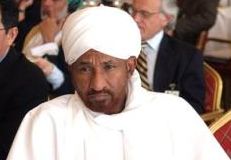Sudan opposition threatens constitution boycott
KHARTOUM, April 24 (AFP) — Sudan’s largest opposition party led a move Sunday to boycott the constitution-drafting process due to seal a peace deal between Khartoum and southern rebels ending more than two decades of conflict.

|
|
Sudan’s former Prime Minister Sadiq Al-Mahdi attends a US-Islamic World Forum meeting held at a Doha hotel Monday, April 11, 2005. (AP) . |
The Umma party of former prime minister Sadeq al-Mahdi and 10 other opposition groups issued a joint statement charging that the makeup of a committee tasked with drafting the interim constitution was not representative of the country’s political landscape.
“The constitution is a document that expresses the consensus of the nation and all ingredients of the Sudanese people and should guarantee the rights of all parties, not only those of specific parties,” said the statement.
The Democratic Unionist Party of Mohammed Osman al-Mirghani was also a signatory and asked for the seat distribution on the 60-member National Constitutional Review Commission (NCRC) to be renegotiated.
“We will not take part in the constitutional commission in its present composition and we demand the representation of the political forces in accordance with their strengths and weights,” DUP deputy chairman Ali Mahmud Hassanain told AFP.
A new constitution is crucial as it would clear the way for the formation of a national unity government and mark the beginning of a six-year interim period called for in the January 9 peace accord that ended 21 years of deadly north-south fighting.
The ruling National Congress party of President Omar al-Beshir and the Sudan People’s Liberation Movement of former southern rebel leader John Garang have already appointed delegates to the commission.
The NCRC was due to have started work on April 23 but its maiden session was delayed by protests from opposition parties and the absence of several key officials attending an Asia-Africa summit in Indonesia.
The NC and SPLM have insisted on applying general power-sharing quotas agreed upon in the January 9 peace deal, which give them 52 percent and 28 percent of the seats respectively, leaving other parties a paltry 20 percent and no power to block decisions.
The Islamist opposition Popular Congress party of jailed leader Hassan al-Turabi has expressed reservations but accepted to take part in the constitution-drafting process.
The Umma and DUP are both larger than the ruling party and represent Sudan’s most powerful religious brotherhoods: the Mahdiya, which has strong support in the strife-torn Darfur region, and the Khatemya, which is closer to Egypt and has its grassroots support in the north.
